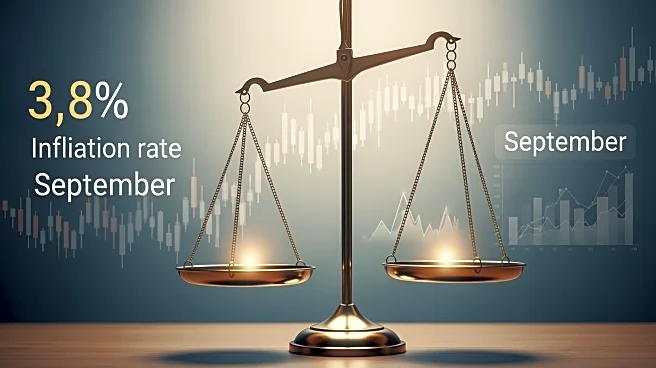What's Happening?
The United Kingdom's inflation rate remained unchanged at 3.8% in September, marking the third consecutive month of stability. This figure is crucial as it influences the calculation of benefit increases scheduled for April. Economists had anticipated
a rise to 4%, but the rate held steady, influenced by higher petrol prices and lower food costs. The Bank of England and most economists had expected a further increase to 4.0%, but the data suggests that inflation may have peaked. This stability has raised hopes for a potential interest rate reduction in November.
Why It's Important?
The steady inflation rate in the UK has significant implications for economic policy and financial markets. A stable inflation rate may lead to a reduction in interest rates, which could stimulate economic growth by making borrowing cheaper for businesses and consumers. This could positively impact the stock market and consumer spending. However, if inflation remains high, it could lead to increased costs for goods and services, affecting consumer purchasing power and potentially slowing economic growth. Stakeholders such as businesses, investors, and policymakers are closely monitoring these developments to adjust their strategies accordingly.
What's Next?
If the inflation rate continues to remain stable, the Bank of England may consider lowering interest rates in November to support economic growth. This decision will be influenced by ongoing economic indicators and the broader global economic environment. Businesses and investors will be watching closely for any signals from the Bank of England regarding future monetary policy changes. Additionally, the government may need to adjust its fiscal policies to address the impact of inflation on public spending and social benefits.
Beyond the Headlines
The current inflation scenario in the UK highlights the complex interplay between global economic factors and domestic policy decisions. The stability in inflation rates, despite expectations of an increase, suggests that external factors such as global oil prices and supply chain disruptions may be influencing domestic economic conditions. This situation underscores the importance of adaptive economic policies that can respond to both domestic and international challenges.
















